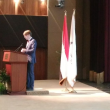S4D4C was at the BioVision 2018 Conference, in Alexandria
22. Mai 2018
Articulated around the theme ‘New Life Sciences: towards Sustainable Developments Goals (SDGs)’, the conference was the ninth event of this kind hosted by the Library of Alexandria. Numerous scientists, leaders and decision makers gathered to discuss topics related to life and environmental sciences. S4D4C gave a keynote in a session on science diplomacy, which took place on the opening day of the three-days-event.
Following its intervention, the project team also contributed to a panel focusing on prospects of science diplomacy in the Euro-Mediterranean region. The fruitful exchange brought together:
- Ms. Russo, Director for International Cooperation (at the Directorate General for Research and Innovation, European Commission);
- Prof. Griset, Professor at Sorbonne University and coordinator of the science diplomacy project InsSciDE;
- Prof. El-Shinawi, Professor of General Surgery, Ain Shams University, Advisor to Egypt’s Minister of Higher Education and Scientific Research for International Collaborations and Agreements, and PRIMA Co-Chair;
- Dr. Bhira, Special Counselor to the Secretary General for Higher Education and Research (Union for the Mediterranean);
- Dr. Khalil, Director of Synchrotron-light for Experimental Science and Applications in the Middle East (SESAME).
The panel was moderated by Prof. Al Zoheiry, President of the Euro-Mediterranean University, who is also a partner in the EL-CSID project.
Panelists agreed that much is already in place in terms of science diplomacy in the Euro-Mediterranean region. SESAME and PRIMA are platforms where science diplomacy led and leads to an intensified contact between neighbouring countries. However, panelists also consider it important to continuously work on the governance of the interface of science and foreign policy and on the training for current and future science diplomats. Although each foreign policy issue where science diplomacy can contribute is unique, much can be learned from the lessons drawn from past examples. S4D4C is working on uncovering and systematising this knowledge. On this basis, S4D4C team will prepare training material for science diplomats and also contribute to the continuous improvement of science diplomacy governance in the EU.
After the session, the project members were glad to be approached by several young scientists who seemed really interested in the science diplomacy topic and in understanding what S4D4C is up to.
At last, the venue of the event, the Library of Alexandria (‘Bibliotheca Alexandrina’) did not fail to impress the team. Considered as the new library of the city, this remarkable space was established 15 years ago at the same location where the old library stood, which was likely destroyed during Antiquity. It stands like a bridge between the University of the city and the sea, connecting the production of knowledge, with its curation, distribution and use. On its side, science diplomacy intends to build bridges between the world of scientists and the one of diplomats, permitting to address global challenges as a whole and in a more efficient way.
Verwandte Artikel:
- Projekt: Using science for/in diplomacy for addressing global challenges
- Veranstaltung: European Science Diplomacy presented in Washington
- News: S4D4C represented EU science diplomacy in Washington D.C.
Tags: international cooperation, science diplomacy, scientific networks, SDGs




















































